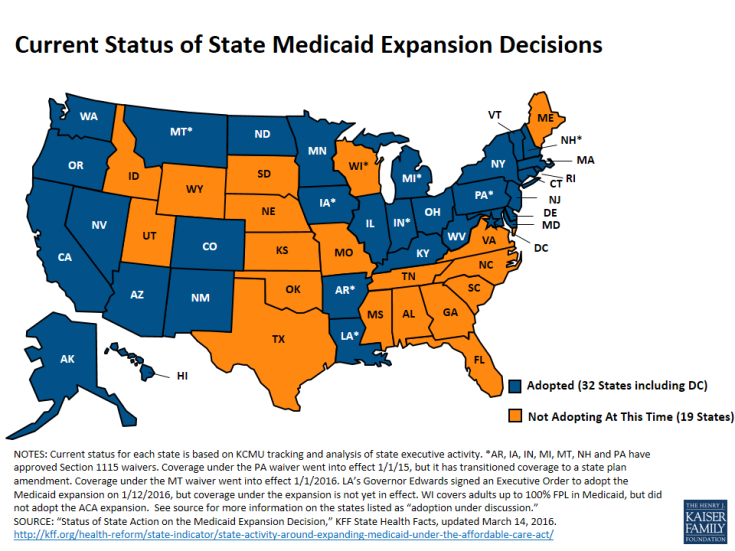Article link

Source: Kaiser Family Foundation (note Maine has since adopted Medicaid Expansion.
Medicaid (healthcare for the poor) expansion is an incentive offered by the Affordable Care Act that nearly 2/3rd of states have accepted. The 18 states who have not accepted Federal dollars to expand their Medicaid programs are may be leaving $180 billion on the table over the next decade. There is a red state/blue state divide on this issue as some states are rejecting the money because of ideological opposition to Medicaid, others for political reasons to protest the Affordable Care Act, and others because state contributions are being phased in and the state may not be able to afford to expand their Medicaid program. Nearly all liberal states and many conservative states such as AZ, LA, AR, KY, WV, MT, AK, IN have accepted funds to expand their Medicaid programs. Lots of connections to AP Gov concepts in this article: Federalism (Federal aid to states), polarization (blue state support for the ACA and red state opposition), budgeting priorities (an upcoming topic about how the nation and states choose to spend tax dollars), and health care policy (an upcoming topic that is near the end of the textbook). Discussion questions: 1. Should states be expanding their Medicaid programs? Do the benefits outweigh the costs? 2. Should the Federal government waive state contributions from states with the lowest tax revenues to further incentivize participation, since these states are likely to have more residents qualifying for Medicaid? 3. What is meant by this quote: "blue states generally subsidize red states, so this is a notable counterexample to the overall trend"?
1 comment:
I believe that states should expand their Medicaid programs as the benefits outweigh the costs. However, for people in government, they can see how their money is spent better than the public can. But, as someone who is not in government, I believe that the benefit of healthcare for the poor, is more important than spending money on other things, such as infrastructure and the army. I think that the federal government should help states who do not have as much money, and therefore, cannot afford to support the Medicaid program. I think that your idea in question #2 is a great way to get states to support Medicaid. However, there are more reasons than just money behind why some states do not want to support Medicaid. Another reason I can think of is that the state government wants to cut back on social welfare programs, and therefore, not expand Medicaid. Literally, “blue states generally subsidize red states,” means that Democratic states generally support Republican states financially. In this counterexample, the Democratic states are more likely to support and expand the Medicaid program, even though they might not be able to afford these programs. This means that Republican states might have to help Democratic states financially in order for them to be able to afford the Medicaid program.
Post a Comment